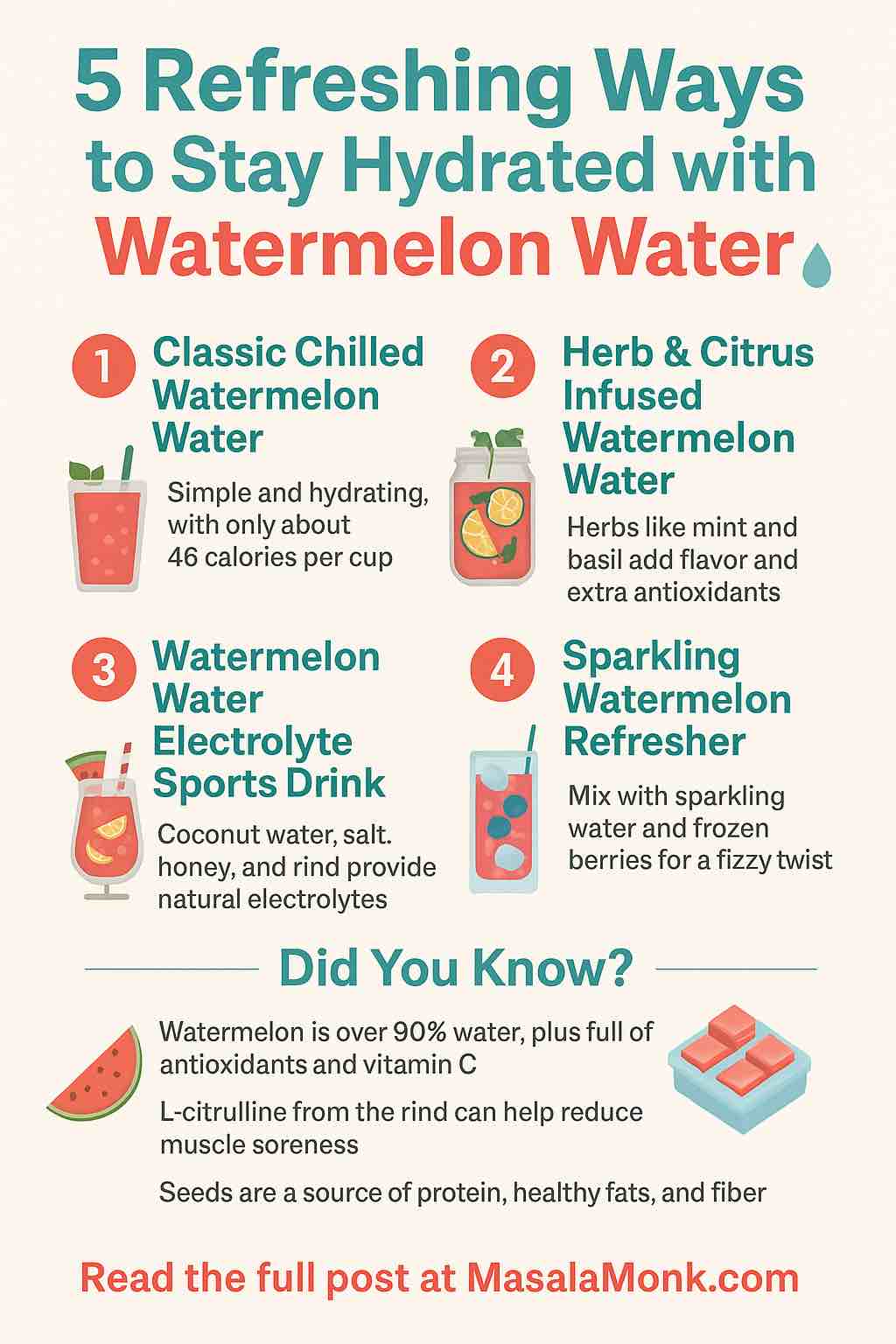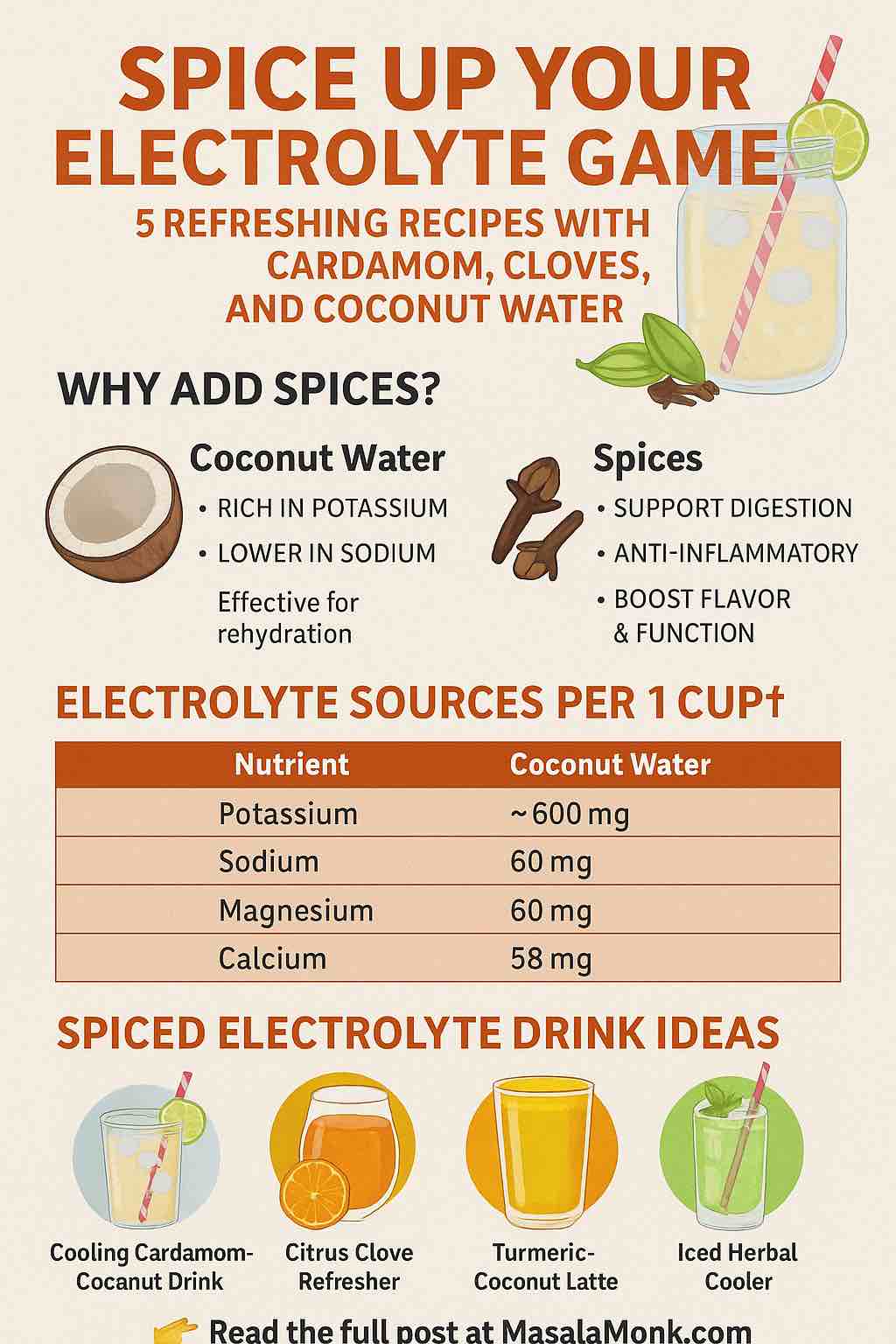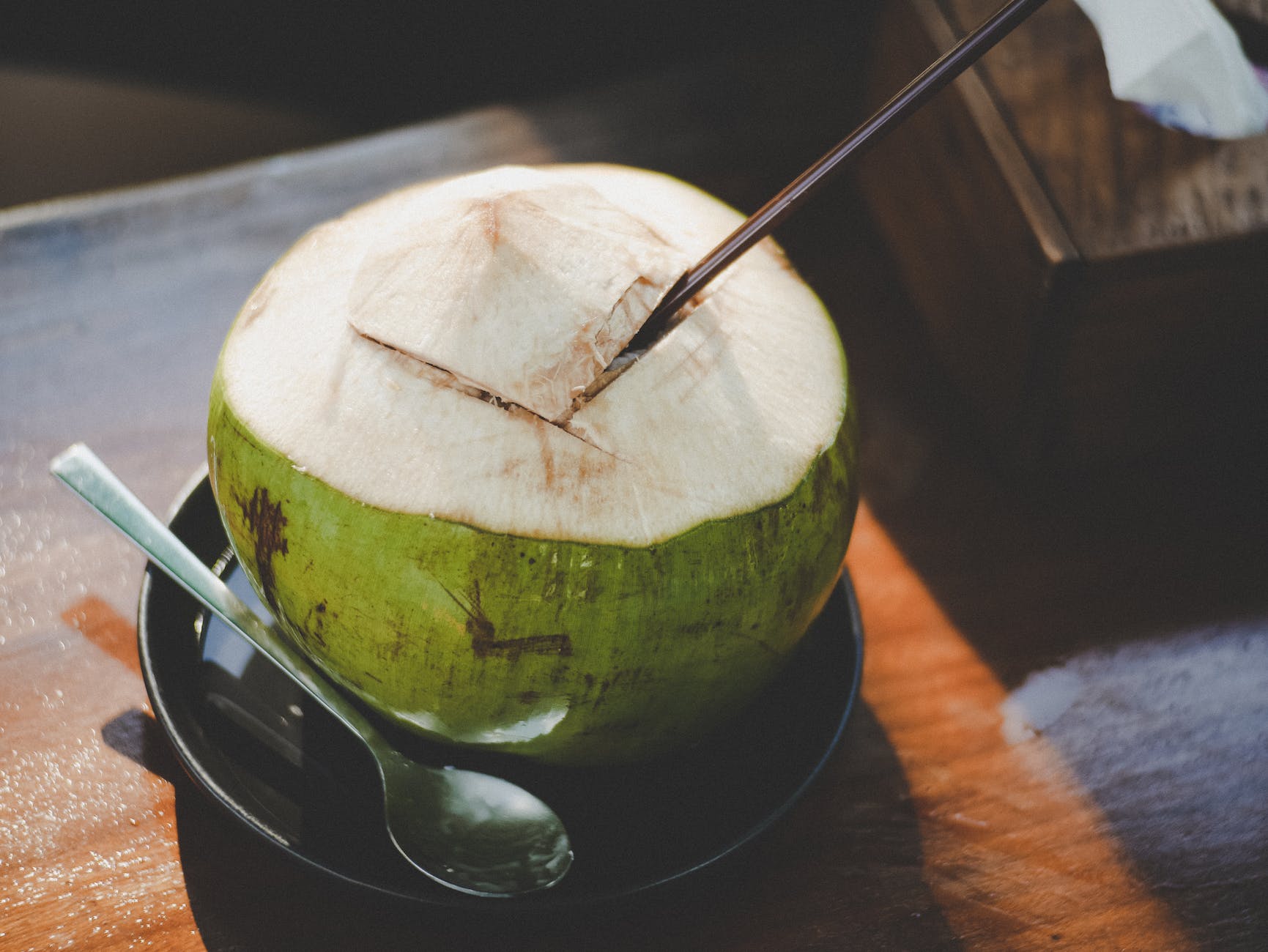
For years, athletes and everyday movers have reached for coconut water after a run, ride, or humid commute. Coconut water delivers a naturally occurring electrolytes mix of potassium, sodium, magnesium, calcium, & phosphorus—a profile that can hydrate efficiently for everyday use and light-to-moderate training. The appeal is obvious: it tastes light, it’s easy on the stomach, and it comes with minerals that your body uses to keep fluids where they belong. Even so, hydration is more than “drink something wet.” The composition of your drink—especially the balance of sodium and potassium—changes how quickly you absorb fluid and how well you retain it during heat, illness, or long workouts.
To ground this discussion, it helps to start with a simple idea: effective hydration is about water + electrolytes + context. In other words, what you’re doing (a slow 30-minute jog vs. a 2-hour tempo run), where you’re doing it (cool office vs. tropical afternoon), and how much you sweat all determine whether plain coconut water is enough—or whether you’ll want to tweak it.
If you want a primer on the broader health story, you can skim our friendly overview of the health benefits of coconut water before diving deeper. It sets the stage without repeating what follows.
The science under the sip
When you drink, the small intestine absorbs fluid fastest when the solution is roughly isotonic and when sodium is present to drive water across the gut wall via sodium–glucose co-transport. Meanwhile, potassium is crucial inside cells, stabilizing nerve impulses and muscle function. Coconut water naturally provides potassium, a little sodium, and smaller amounts of magnesium and calcium. Consequently, many people feel great sipping it during day-to-day life or after light training.
However, two real-world factors complicate things. First, sweat sodium losses can vary wildly by person (some lose under 500 mg per liter of sweat; others lose over 1,000 mg). Second, the electrolyte numbers in coconut water vary by variety, growing conditions, and processing. To keep claims concrete, compare brand labels against a public reference. As a starting point for nutrient baselines and cross-checking, browse USDA FoodData Central. It’s not a substitute for your exact bottle, but it keeps you anchored in real data.
Also Read: Benefits of Lemon and Lime Water: Refreshing Hydration with a Citrus Twist
What Coconut Water & Electrolytes actually look like in the bottle
In practice, packaged coconut water tends to be potassium-forward with modest sodium. That’s a wonderful profile for everyday hydration, and it explains why people feel refreshed quickly without the heavy, syrupy feel of many sports drinks. Notably, individual labels tell the real story; for example, one typical retail panel for a premium pink Nam Hom style lists hundreds of milligrams of potassium per serving with tens of milligrams of sodium—a pattern you’ll see often. If you’re curious about a concrete example of this potassium-high, sodium-modest pattern, take a look at a representative store label for a leading organic brand like this Harmless Harvest nutrition panel. Once you start scanning a few labels, you’ll notice how consistent that ratio can be.
All the same, your needs might not be “typical.” If you’re training in hot weather, racing, working outdoors, or you consider yourself a “salty sweater,” sodium replenishment matters more than flavor. That’s where a practical approach to Coconut Water & Electrolytes comes in—enjoy the taste and potassium, then adjust the sodium to match the day.
Coconut Water & Electrolytes vs. sports drinks: choosing with intention
Although sports drinks dominate stadium coolers for a reason, coconut water holds its own for many scenarios. To decide confidently, focus on use case rather than brand loyalty.
For short efforts and daily sipping, coconut water’s natural sweetness and high potassium content are often perfect. You hydrate, you avoid sticky aftertastes, and you take in gentle carbohydrates. For extended efforts, heavy sweat, or back-to-back sessions, sodium drives the bus. In that context, products formulated specifically for higher sodium can be advantageous.
To see how labels differ, peek at a few manufacturer pages. For instance, Gatorade lists about 160 mg sodium per 12 fl oz on its official panel (PepsiCo Product Facts). Meanwhile, Pedialyte Classic—built as an oral rehydration solution—comes in far higher, around 390 mg sodium per 12 fl oz, with a notable potassium contribution as well (Pedialyte Classic). By contrast, Liquid I.V. Hydration Multiplier supplies a robust sodium dose per stick when mixed as directed, which many endurance athletes appreciate for long efforts or very hot days (Hydration Multiplier). Finally, Electrolit Coconut offers a ready-to-drink, pharmacy-style electrolyte profile; the brand’s coconut flavor showcases the flavor you like alongside a broader mineral blend (Electrolit Coconut), and some retail panels show substantially more sodium than plain coconut water in a similar serving (example retail facts).
In short, coconut water shines when you don’t need so much sodium; sports drinks or ORS-style formulas shine when you do.
Also Read: Pedialyte and Electrolytes for Diarrhea
Making Coconut Water & Electrolytes “endurance-ready” without losing the taste
Happily, you don’t need to abandon coconut water on hard days—you can upgrade it. Rather than reinvent the wheel, start with a bottle you enjoy, then follow three steps:
- Add sodium deliberately. A pinch of fine salt (⅛–¼ tsp) raises sodium quickly without turning the drink into soup. Stir, sip, and adjust for taste.
- Dilute to the day. If it’s sweltering outside, top up with cold water and ice; you’ll keep coconut flavor while bringing the overall drink closer to an easy-to-absorb concentration.
- Match carbohydrates to effort. For longer sessions at a steady tempo, a teaspoon or two of sugar or honey smooths energy delivery; for easy days, you can skip the extras.
For more ideas—and to keep your pantry versatile—check our kitchen-tested guide to natural homemade electrolyte drinks. You’ll find straightforward combinations you can tailor on the fly, including coconut-forward options that don’t taste like liquid candy.
Also Read: Coconut Water Cocktails: 10 Easy, Refreshing Drinks
When Coconut Water & Electrolytes aren’t the right tool
Despite its many strengths, coconut water isn’t always ideal. During gastrointestinal illness, severe dehydration, or sustained heat stress, the body benefits from a composition close to oral rehydration solution (ORS) standards. Clinically, ORS balances sodium and glucose to enhance absorption at a known osmolarity. For a concise medical summary—not marketing—review this professional write-up on oral rehydration therapy. It outlines why sodium and glucose together move water efficiently across the gut wall.
Accordingly, on tough days, you may choose a stick of Liquid I.V., a bottle of Electrolit, or a serving of Pedialyte to meet higher sodium needs, then return to coconut water as your pleasant, everyday baseline.
Also Read: Is Energy drink Gatorade Worth the Hype?
Everyday uses for Coconut Water & Electrolytes that feel effortless
While race-day decisions get attention, most hydration moments are ordinary: a gym session squeezed between meetings, a walk in muggy weather, or a late night after spicy food. In those moments, coconut water’s gentle taste and naturally high potassium make it easy to sip enough without forcing it.
- Desk days: keep a chilled bottle nearby and alternate sips with plain water. You’ll cover potassium comfortably while staying light.
- Hot commutes: pre-cool the bottle; the cold shock plus mild sweetness makes consistent drinking almost automatic.
- Short workouts: drink a little before to prime, a little after to re-balance, and keep the rest in the fridge for cooking (it brightens smoothies surprisingly well).
And because delight matters, try flavor pivots that keep the profile clean. For instance, these cooling cucumber electrolyte quenchers ride the same hydration logic while giving you a fresh, spa-like twist that never feels cloying.
A practical recipe: build your own Coconut Water & Electrolytes
Here’s a fast, flexible mix that scales up effortlessly:
- Base: 1 cup coconut water
- Sodium: ⅛–¼ tsp fine salt (start small; increase on hotter, longer days)
- Citrus: 1–2 tbsp lemon or lime juice for brightness
- Optional carbs: 1–2 tsp sugar or honey if you’re training long
- Top up: cold water/ice to ~700–750 ml total
Shake, taste, and adjust. On easy days, reduce salt. On simmering afternoons or hilly runs, nudge it upward. If you prefer a precise pantry system with variations for different goals, you’ll love our roundup of post-workout electrolyte drink recipes; it maps effort to ingredients without overcomplicating your kitchen.
Meanwhile, if you’re experimenting with low-carb or keto, you can still keep coconut water in your rotation, just in smaller, well-timed amounts. For templates that respect carb budgets yet remain practical, lean on these keto electrolyte drink ideas and tweak from there.
And if you’re training while fasting—or supporting long focus blocks with minimal calories—you can use fasting-friendly builds that stay gentle on the stomach. For thoughtful, tasteful options, see our fasting electrolyte recipes.
Brand reality check without the noise
Because labels evolve, it’s smart to verify numbers at the source. Manufacturer or retailer panels let you check sodium and potassium per serving and compare apples to apples.
- For a mainstream benchmark, consult Gatorade’s nutrition panel here: PepsiCo Product Facts.
- When you need ORS-style sodium, Pedialyte Classic spells out its formulation clearly on the brand site: Abbott Nutrition Pedialyte.
- If you want portable sticks with a stronger sodium profile, Liquid I.V. lists ingredient details and serving directions on the Hydration Multiplier page.
- For a coconut-flavored RTD electrolyte drink, Electrolit Coconut blends sodium with other minerals; browse the product page and, when comparing, peek at a retail nutrition panel example to gauge per-serving sodium.
By checking labels periodically and matching them to your use case, you’ll stay ahead of reformulations without chasing trends.
How to choose: a label checklist for Coconut Water & Electrolytes
When your goal is clear, decisions get easy. Use this quick, human-friendly checklist:
- Sodium: for long, sweaty sessions—or if you know you’re a salty sweater—prioritize higher sodium or plan to add a pinch of salt.
- Potassium: coconut water typically covers this well. If you’re aiming for balanced daily intake, you’re already winning here.
- Total sugars: align to effort; enjoyable sweetness supports longer sessions, but on easy days you can dilute.
- Serving size realism: convert the label to per bottle numbers, not just per cup, so you know what you actually drink.
- Stomach feel: if syrupy drinks never sit right, let coconut water lead; if you need punch on race day, use a higher-sodium option sparingly and test in training.
- Context: hot weather, double sessions, or illness change the math—choose accordingly.
As you refine the habit, your taste buds and performance will tell you when you’ve hit the sweet spot.
Also Read: Lemon Mint Water: 5 Refreshing Recipes to Hydrate and Invigorate
Whole-food pairings that elevate Coconut Water & Electrolytes
Hydration doesn’t happen in a vacuum. Pair your drink with foods that bring potassium and a touch of sodium to the table. A banana with a lightly salted rice cake, a baked potato with a pinch of salt, or a bowl of broth alongside your bottle can round out recovery without extra fuss. For a concise reference you can save on your phone, grab our printable Potassium-Rich Foods List. It keeps choices simple when you’re busy or traveling.
Putting Coconut Water & Electrolytes to work—scenarios and solutions
Because “what should I drink?” is usually a context question, here are a few everyday scenarios with practical decisions:
- Morning mobility + short jog (cool weather): sip half a bottle of coconut water beforehand, finish it afterward, and call it good. No tweaks necessary.
- Lunchtime strength session (air-conditioned gym): start with coconut water, add a whisper of salt if your shirt shows salt rings regularly, and keep plain water nearby.
- Evening tempo run (warm, humid): pre-salt your coconut water lightly, top with ice, and bring a small soft flask; refill with plain water at a fountain if needed.
- Outdoor workday (high heat): alternate between coconut water and a higher-sodium helper such as Electrolit or a Liquid I.V. mix; prioritize cooling the drinks.
- Travel day + spicy dinner: coconut water plus a salty snack balances fluids without overdoing sugar; finish with herbal tea and call it a night.
- Recovery after mild stomach upset: when you’re ready for fluids again, begin with small sips; if losses were significant, consider an ORS-style drink guided by the oral rehydration therapy overview, then return to coconut water as appetite normalizes.
Step by step, you’ll learn to treat hydration less like a rulebook and more like a dial you turn with weather, effort, and taste.
A final word on confidence and consistency
Ultimately, the smartest hydration routine is the one you’ll follow consistently. Coconut Water & Electrolytes make that easier because they taste good, feel light, and deliver real minerals your cells use every minute. On easy days, drink it straight. On hard days, salt it and dilute. When illness or extreme heat raises the stakes, reach for an ORS-style option, then transition back.
Rather than chase perfect numbers, choose clarity over complication: keep a bottle of coconut water in the fridge, a small salt tin in your gym bag, and a plan for long or hot days. With those simple tools—and a habit of checking labels on official pages like Gatorade, Pedialyte, Liquid I.V., and Electrolit Coconut—you’ll hydrate on purpose, not by accident.
Meanwhile, keep things enjoyable. Rotate flavors, add citrus, pour over ice, or build one of our gentle post-workout electrolyte drink recipes. You’ll feel the difference not only in how you perform, but also in how quickly you bounce back. And that, more than anything, is what smart hydration is supposed to deliver.
FAQs
1) What are Coconut Water & Electrolytes, exactly?
Coconut Water & Electrolytes refers to the naturally occurring minerals—primarily potassium, plus sodium, magnesium, calcium, and phosphorus—found in coconut water. Collectively, they help regulate fluid balance, nerve impulses, and muscle contraction during activity.
2) Does coconut water actually have enough electrolytes for workouts?
Generally, yes for light-to-moderate sessions because potassium is abundant; however, sodium is often modest. Consequently, for long, sweaty efforts many people benefit from adding extra sodium or alternating with a higher-sodium drink.
3) How much sodium and potassium are typical in Coconut Water & Electrolytes?
Typically per cup (240 ml), many packaged coconut waters provide several hundred milligrams of potassium but only a few dozen milligrams of sodium. Therefore, the drink is potassium-forward and sodium-light compared with classic sports drinks.
4) Is coconut water isotonic?
Broadly speaking, the carbohydrate concentration can be near isotonic, yet the sodium concentration is usually below sweat losses. Accordingly, coconut water is excellent for everyday hydration and shorter workouts, while endurance sessions may require additional sodium.
5) Is coconut water good for electrolyte balance after running?
Frequently, yes. Potassium helps restore intracellular balance and supports normal muscle function. Still, runners who lose lots of salt may need to complement Coconut Water & Electrolytes with a sodium boost to feel fully recovered.
6) Which is better: Coconut Water & Electrolytes or Gatorade?
It depends on the situation. Coconut water offers a lighter taste and higher potassium with fewer additives; Gatorade typically supplies more sodium and predictable carbohydrates for extended or very hot workouts.
7) How does coconut water compare with Liquid I.V. or similar mixes?
Powdered mixes often deliver substantially more sodium per serving and a set ratio with glucose for rapid absorption. Meanwhile, Coconut Water & Electrolytes bring natural potassium and an easy-drinking profile—great for moderate efforts or daily use.
8) What about Electrolit, Pedialyte, or ORS-style options?
Those formulas emphasize sodium first, targeting fast rehydration during illness, heat stress, or prolonged exercise. In contrast, coconut water is typically more pleasant for routine hydration but may need sodium support in these tougher scenarios.
9) Best coconut water for electrolytes—what should I look for?
Prioritize straightforward ingredient lists and transparent nutrition panels. Ideally, you’ll see high potassium per serving and, if you train in heat, either moderate sodium or a plan to add a pinch of salt.
10) Is coconut water high in sodium?
Usually, no. Most packaged options are relatively low in sodium compared with sports drinks. Consequently, heavy sweaters should either add salt or pair Coconut Water & Electrolytes with a higher-sodium beverage.
11) Does coconut water contain magnesium and calcium?
Yes, but in modest amounts relative to potassium. These minerals still contribute to overall electrolyte intake, though they shouldn’t be your sole source if you specifically need higher magnesium or calcium.
12) Can Coconut Water & Electrolytes help with cramps?
Sometimes. Adequate potassium and fluids can ease cramp risk in certain cases; however, cramps are multifactorial. When sweat sodium losses are high, meeting sodium needs typically matters as much—or more—than potassium alone.
13) Is coconut water good for low sodium levels (hyponatremia)?
No beverage should be used to “treat” a medical condition without guidance. That said, because coconut water is usually low in sodium, it is not the ideal choice when sodium repletion is urgently required.
14) Are “coconut juice” or “buko juice” different from Coconut Water & Electrolytes?
Terminology varies by region. Many products labeled “coconut juice” are essentially coconut water. Nevertheless, always check the label for added sugars or flavors, which can change the electrolyte-to-carb balance.
15) Is coconut milk or coconut oil useful for electrolytes?
Not really. Electrolytes reside in the water portion of the fruit. Coconut milk is predominantly fat and coconut oil is pure fat—neither is an electrolyte beverage.
16) Can Coconut Water & Electrolytes fit keto or low-carb plans?
Often in small, well-timed servings. Because coconut water contains natural carbs, strict keto followers tend to use smaller amounts around workouts or dilute with water to manage carbohydrate totals.
17) What’s the best time to drink coconut water for training?
Commonly: a little before easy sessions to prime, then more afterward to replenish. During longer efforts, many athletes sip steadily while ensuring separate sodium coverage if conditions are hot or sweat rates are high.
18) How can I make Coconut Water & Electrolytes more “endurance-ready”?
Practically speaking, add a small pinch of fine salt, top with cold water to taste, and—if needed—include a teaspoon of sugar or honey for longer efforts. This simple adjustment raises sodium, improves absorption, and keeps flavor clean.
19) Are flavored coconut waters okay for electrolytes?
Often yes, provided the flavoring doesn’t dramatically increase sugar or mask the mineral profile. Prefer options with straightforward ingredients and consistent nutrition panels so you know what you’re getting each bottle.
20) Do brands like BODYARMOR, NOOMA, ROAR Organic, or Vita Coco change the equation?
Each positions Coconut Water & Electrolytes a bit differently—some add minerals or vitamins, others keep it simple. Because formulations can vary, the smartest move is to compare sodium, potassium, and total sugars per serving against your training demands.
21) Can kids or older adults use coconut water for hydration?
Typically, yes for casual hydration when eating normally. However, during illness or significant fluid loss, higher-sodium solutions are often preferred; Coconut Water & Electrolytes can still play a role alongside regular food once appetite returns.
22) Will Coconut Water & Electrolytes upset my stomach during workouts?
Rarely, as coconut water is generally easy to tolerate. Even so, personal digestion differs. Therefore, test during training—not on race day—and adjust dilution and sodium to your comfort.
23) What serving size makes sense?
A practical starting point is 250–500 ml around easy sessions, then adjust for duration, temperature, and sweat rate. For long or hot efforts, scale volume gradually and ensure your sodium strategy keeps pace.
24) Do I still need plain water if I’m drinking coconut water?
Usually, yes. Alternating Coconut Water & Electrolytes with water helps you manage sweetness and total carbohydrate intake while maintaining steady fluid absorption over time.
25) Quick summary: when should I choose Coconut Water & Electrolytes?
Choose it for day-to-day hydration, short or moderate workouts, and times you want a lighter, more natural taste. Choose a higher-sodium option—or fortify your coconut water—when heat, duration, or heavy sweat make sodium replacement the priority.












